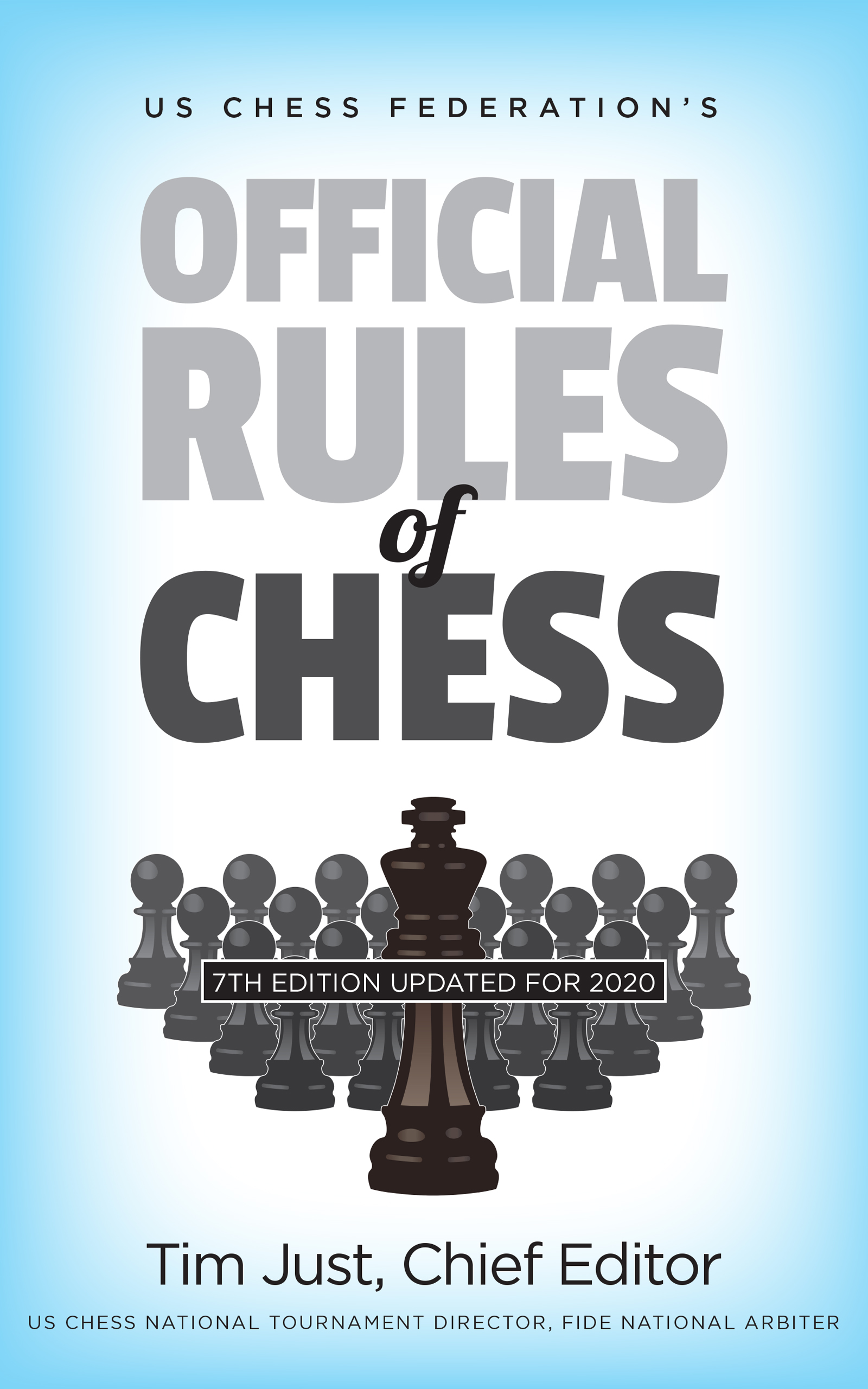It’s the small stuff that makes up the quality of a good tournament experience. You have some control over that.
Have a look at an earlier “Just the Rules” column where technical rulebook jargon was replaced with everyday language. Common language is easy to understand and remember for players and TDs alike. This month, it’s time for some more hacks with a slightly different bent.
Here we are going to look at how you can increase the odds of having a hassle-free tournament — at least rule-wise. Learn how to avoid tripping over the rules with these pro-active hacks. Some problems are preventative, and hacks like these stop major headaches before they become migraines.
1. Learn to Set Your Clock: Most wood pushers know how to set their own clocks, at least for the tournament time control. Not only do those devices come with instructions, but there are online videos that point owners in the right direction. Running around at the start of a round to get your clock set properly is iffy at best.
TDs don’t know how to set every clock ever manufactured. They might know how the major brands are set, but those new, just-off-the-assembly-line models? Not likely. Setting your own device avoids all the hassles of waiting for the TD.
You could try the book seller instead. But don’t expect the seller to interrupt a sale to help you!
Your fellow chess lovers might be able to help you out, but will they do it right? Will 90 minutes turn into 90 hours when they get the job done?
Are you willing to learn the opening lines of your favorite chess weapon? If you are, then taking a bit of time to learn to set your clock for the event’s time control is even easier. And if you get real ambitious learning to add two minutes of penalty time is a nice touch — in the rare event that happens in your contest.
2. Don’t Bother with Your Clock’s Move Counter: You can’t use the clock move counter to make any claim of any kind — even time forfeit claims.
3. If You Have Special Needs, Alert the Staff Early: If you have special needs, alert the TD staff (or organizer) well ahead of time. They typically can meet your requirements if they are alerted early. Physical handicaps are one obvious entry into the special needs category. Another typical concern is religious; i.e., some players have restrictions regarding notation and clock pressing. Springing any kind of need on a TD at the last moment may not be met with much success.
4. You Can Ask the TD To Not Pair You with a Relative or Teammate: Do this well ahead of the pairings. There is really no downside to doing this ASAP — like at registration. The worst case is if the TD denies your request, which they are allowed to do. You have lost nothing if that happens. Talking to the TD before the event’s round one pairings are made is ideal. You might find that a TD is willing to allow the non-pairing in the early rounds only. And some will simply just honor your request.
5. Use the Bye Request Sheet: Ideally you should get this info to the TD before the tournament starts — like at registration. But things change. Sometimes you need to take a round off. Please don’t just tell the TD. They might forget. Ask where the bye request list is located and use it.
Do this well before the pairings are made. At some events there may be a time limit for signing up for half-point byes — find out what that time limit is. Some byes may be only worth a zero point after that cut-off time passes. This little gesture, using the bye sign-up sheet, means some other wood pusher will not be sitting there waiting for you to arrive when you get paired but don’t plan to show up.
6. Withdrawing? Sign the Withdrawal List: If you plan to not finish the tournament, find the withdrawal list and fill it out. If you decide to not play after you have left the site, get the withdrawal info to the TD.
In this day and age of electronic communication, notification of withdrawl is probably an easy task. Worst-case, one of your friends might be able to get your withdrawal notice to the TD before the pairings are made. You don’t want to leave someone sitting there waiting for a no-show opponent.
7. Check the Wallchart and the Results Sheet for Errors: Avoid errors. Check the accuracy of wallcharts and results sheets ASAP. Getting mis-paired as the result of an error does no one any good. Waiting for several rounds to report an error just diminishes your chances of getting a satisfactory fix.
8. Check on the Mask Rules: While you are used to the COVID-19 mask regulations in your neck of the woods, they are not the same everywhere. Rules can vary from town to town, county to county, etc. Find out ahead of time about the event’s COVID-19 rules. Then decide if those regulations meet your needs or not — and don’t fight with the organizer about how they runs their tournament.
9. Make Sure the TD Has Your Contact Info: If you want your jingle jangle, the organizer (often the same person as the TD) needs to know where to send your loot. Leaving your contact info allows you to disappear early at the end of the event when you are in contention for some prizes. It also gives the TD some method for contacting you if there are any questions about your game result.
10. Shut Down Your Electronic Equipment Completely: Do you want to avoid being accused of cheating? How about preventing the pain-in-the-neck complaints if your device makes unexpected noises?
Shut down completely ALL of your electronic gizmos. None of them should inadvertently: beep, flash, alert, automatically display messages, or do anything else for any reason. Tuck all of that turned -ff gear away if you are keeping them in the playing room. Or, leave ALL of your electronic equipment someplace safe outside of the playing room.
And for those of you using electronic medical devices — please bring some sort of verification in order the use that equipment. Contacting the TD early is advised.
The free, updated US Chess Rules (Chapters 1+2 + 9 + 10 +11 from the 7th edition rulebook) are now downloadable and available online. Past “Just the Rules” columns can be viewed here. Plus listen to Tim when he was a guest on the US Chess podcast “One Move at a Time.”
Tim Just is a National Tournament Director, FIDE National Arbiter, and editor of the 5th, 6th, and 7th editions of the US Chess Rulebook. He is also the author of My Opponent is Eating a Doughnut & Just Law, which are both available from US Chess Sales and Amazon/Kindle. Additionally, Tim recently revised The Guide To Scholastic Chess, a guide created to help teachers and scholastic organizers who wish to begin, improve, or strengthen their school chess program. Tim is also a member of the US Chess Rules Committee. His new column, exclusive to US Chess, “Just the Rules” will help clarify potentially confusing regulations.
Categories
Archives
- January 2026 (3)
- December 2025 (27)
- November 2025 (29)
- October 2025 (39)
- September 2025 (27)
- August 2025 (29)
- July 2025 (43)
- June 2025 (25)
- May 2025 (24)
- April 2025 (29)
- March 2025 (29)
- February 2025 (20)
- January 2025 (24)
- December 2024 (34)
- November 2024 (18)
- October 2024 (35)
- September 2024 (23)
- August 2024 (27)
- July 2024 (44)
- June 2024 (27)
- May 2024 (31)
- April 2024 (51)
- March 2024 (34)
- February 2024 (25)
- January 2024 (26)
- December 2023 (29)
- November 2023 (26)
- October 2023 (37)
- September 2023 (27)
- August 2023 (37)
- July 2023 (47)
- June 2023 (33)
- May 2023 (37)
- April 2023 (45)
- March 2023 (37)
- February 2023 (28)
- January 2023 (31)
- December 2022 (23)
- November 2022 (32)
- October 2022 (31)
- September 2022 (19)
- August 2022 (39)
- July 2022 (32)
- June 2022 (35)
- May 2022 (21)
- April 2022 (31)
- March 2022 (33)
- February 2022 (21)
- January 2022 (27)
- December 2021 (36)
- November 2021 (34)
- October 2021 (25)
- September 2021 (25)
- August 2021 (41)
- July 2021 (36)
- June 2021 (29)
- May 2021 (29)
- April 2021 (31)
- March 2021 (33)
- February 2021 (28)
- January 2021 (29)
- December 2020 (38)
- November 2020 (40)
- October 2020 (41)
- September 2020 (35)
- August 2020 (38)
- July 2020 (36)
- June 2020 (46)
- May 2020 (42)
- April 2020 (37)
- March 2020 (60)
- February 2020 (38)
- January 2020 (45)
- December 2019 (34)
- November 2019 (35)
- October 2019 (42)
- September 2019 (45)
- August 2019 (56)
- July 2019 (44)
- June 2019 (35)
- May 2019 (40)
- April 2019 (48)
- March 2019 (61)
- February 2019 (39)
- January 2019 (30)
- December 2018 (29)
- November 2018 (51)
- October 2018 (45)
- September 2018 (29)
- August 2018 (49)
- July 2018 (35)
- June 2018 (31)
- May 2018 (39)
- April 2018 (31)
- March 2018 (26)
- February 2018 (33)
- January 2018 (30)
- December 2017 (26)
- November 2017 (24)
- October 2017 (30)
- September 2017 (30)
- August 2017 (31)
- July 2017 (28)
- June 2017 (32)
- May 2017 (26)
- April 2017 (37)
- March 2017 (28)
- February 2017 (30)
- January 2017 (27)
- December 2016 (29)
- November 2016 (24)
- October 2016 (32)
- September 2016 (31)
- August 2016 (27)
- July 2016 (24)
- June 2016 (26)
- May 2016 (19)
- April 2016 (30)
- March 2016 (36)
- February 2016 (28)
- January 2016 (32)
- December 2015 (26)
- November 2015 (23)
- October 2015 (16)
- September 2015 (28)
- August 2015 (28)
- July 2015 (6)
- June 2015 (1)
- May 2015 (2)
- April 2015 (1)
- February 2015 (3)
- January 2015 (1)
- December 2014 (1)
- July 2010 (1)
- October 1991 (1)
- August 1989 (1)
- January 1988 (1)
- December 1983 (1)









